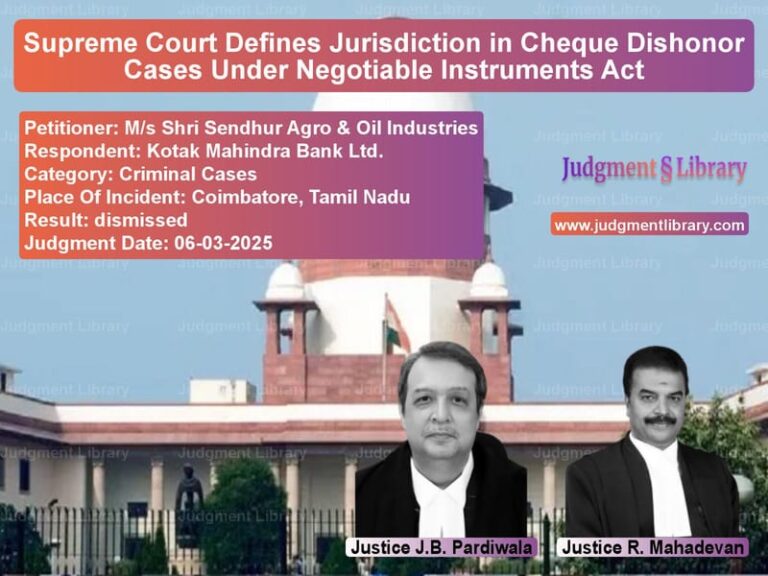Murder Accused Denied Bail: Supreme Court Cancels High Court’s Order
The case of Kamla Devi vs. State of Rajasthan & Another revolves around a brutal murder in which the Supreme Court was called upon to decide whether the High Court had correctly exercised its discretion in granting bail to the accused. The Court ruled that the High Court had failed to consider the gravity of the offense and set aside the bail orders.
This judgment is significant as it clarifies the principles governing the grant of bail, particularly in cases involving heinous crimes, and reinforces the importance of judicial reasoning in bail orders.
Background of the Case
The case pertains to the murder of Sohan Singh in Rajsamand, Rajasthan. The key events in the case are as follows:
- May 13, 2019: Sohan Singh left home to attend a wedding and did not return.
- May 14, 2019: His wife, Kamla Devi, filed a missing person report.
- May 15, 2019: An FIR (No. 229/2019) was registered after their son reported that his father was last seen outside the house of the accused, where he was allegedly dragged inside, assaulted, and later thrown into a well.
- July 9, 2019: The police filed a charge sheet under Sections 302, 201, and 34 of the Indian Penal Code (IPC).
- September 9, 2019: The Rajasthan High Court granted bail to accused Kishore Singh.
- October 17, 2019: The Rajasthan High Court granted bail to accused Kalu Singh.
- March 11, 2022: The Supreme Court ruled on the appeal filed by Kamla Devi, challenging the bail orders.
The prosecution alleged that the accused, along with their mother, Teji Devi, had conspired to kill Sohan Singh and dispose of his body.
Legal Issues Considered
- Whether the High Court failed to consider material aspects while granting bail.
- Whether the accused posed a risk of tampering with evidence or intimidating witnesses.
- The applicability of Supreme Court precedents on bail in murder cases.
Petitioner’s Arguments (Kamla Devi)
- The gravity of the offense was not properly considered by the High Court.
- The accused attempted to conceal the crime by throwing the body and murder weapon into a well.
- One of the accused, Kishore Singh, had threatened the petitioner after being released on bail.
- The High Court’s orders were cryptic and lacked reasoning, violating judicial standards.
Respondent’s Arguments (State of Rajasthan & Accused)
- The post-mortem report suggested cardiopulmonary arrest, making the murder allegations uncertain.
- The accused had no prior criminal record and had cooperated with the investigation.
- The High Court was not required to provide detailed reasoning for granting bail.
- The complaint about threats made by Kishore Singh was fabricated.
Supreme Court’s Judgment
The Supreme Court bench, comprising Justices M.R. Shah and B.V. Nagarathna, ruled in favor of the petitioner and canceled the bail orders.
1. High Court Ignored Material Evidence
“The High Court, while passing the impugned orders, has not taken into account even a single material aspect of the case.”
The Court found that the High Court failed to consider the evidence linking the accused to the crime.
2. Threat to Witnesses and Tampering of Evidence
“The possibility of the accused threatening or otherwise influencing the witnesses, if on bail, cannot be ruled out.”
The Court noted that the accused had already threatened the petitioner, justifying the cancellation of bail.
3. Bail Orders Were Cryptic and Without Proper Justification
“The High Court has granted bail to the respondents-accused by passing a very cryptic and casual order, de hors cogent reasoning.”
The Court ruled that the High Court had erred in granting bail without discussing the seriousness of the offense.
4. Cancellation of Bail and Immediate Surrender Ordered
“The respondents-accused are on bail. Their bail bonds stand canceled and they are directed to surrender before the concerned jail authorities within a period of two weeks.”
The Supreme Court revoked the bail and ordered the accused to return to custody.
Key Takeaways from the Judgment
- The Supreme Court reaffirmed that serious criminal cases require a cautious approach in granting bail.
- Bail orders must contain proper reasoning and cannot be issued casually.
- If accused persons threaten witnesses, their bail can be revoked.
- Courts must consider the gravity of the offense before granting bail.
Implications of the Verdict
This ruling has significant implications for bail jurisprudence in India:
- High Courts must properly assess bail applications in serious offenses.
- Bail orders that lack reasoning can be challenged and overturned.
- The decision protects victims and witnesses from potential intimidation.
Overall, this Supreme Court ruling ensures that courts exercise caution while granting bail in cases involving serious offenses such as murder.
Petitioner Name: Kamla Devi.Respondent Name: State of Rajasthan & Another.Judgment By: Justice M.R. Shah, Justice B.V. Nagarathna.Place Of Incident: Rajsamand, Rajasthan.Judgment Date: 10-03-2022.
Don’t miss out on the full details! Download the complete judgment in PDF format below and gain valuable insights instantly!
Download Judgment: kamla-devi-vs-state-of-rajasthan-&-supreme-court-of-india-judgment-dated-10-03-2022.pdf
Directly Download Judgment: Directly download this Judgment
See all petitions in Murder Cases
See all petitions in Bail and Anticipatory Bail
See all petitions in Judgment by Mukeshkumar Rasikbhai Shah
See all petitions in Judgment by B.V. Nagarathna
See all petitions in allowed
See all petitions in Stayed
See all petitions in supreme court of India judgments March 2022
See all petitions in 2022 judgments
See all posts in Criminal Cases Category
See all allowed petitions in Criminal Cases Category
See all Dismissed petitions in Criminal Cases Category
See all partially allowed petitions in Criminal Cases Category







